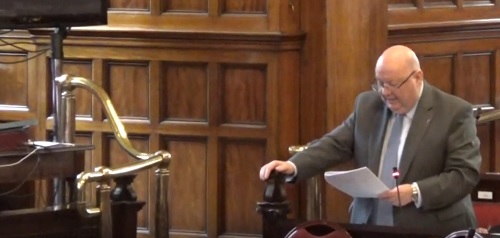After changes in 2014 allowing filming of local government meetings what are the safeguards proposed on filming and broadcast of judicial sentencing remarks in England and Wales?
Please accept YouTube cookies to play this video. By accepting you will be accessing content from YouTube, a service provided by an external third party.
If you accept this notice, your choice will be saved and the page will refresh.
Footage of Liverpool City Council conferring the appointment of Honorary Recorder on His Honour Judge Menary QC 22nd May 2019

By John Brace – Local Government Editor
and
Leonora Brace – Criminal Justice Correspondent
After a pilot of not for broadcast filming of sentencing remarks (which included Liverpool Crown Court) draft legislation regarding the filming and broadcasting of sentencing remarks has been laid as draft legislation by the Lord Chancellor (with the agreement of the Lord Chief Justice).
It is unknown at this stage when it will come into force.
However here is a brief summary of the effect of the draft legislation if implemented in its current form.
It will only apply to courts in England and Wales only and only to the Crown Court. The aim of it is to increase transparency in the justice system and public engagement with and understanding what happens in courts.
Only broadcasters with a contract with the Lord Chancellor will be allowed to film.
Filming and broadcast can only happen with permission (in writing) of the Judge* and in accordance with any restrictions imposed. Broadcast must not breach any reporting restrictions.
*see narrow definition of Judge below at **
Such footage will not be permitted to be used for:-
i) a party political broadcast,
ii) advertisement or promotion (apart from advertising or promoting the broadcast itself),
iii) light entertainment or
iv) satire.
**The following definition of “Judge” is used:-
(a) a High Court Judge;
(b) a Senior Circuit Judge who is also the Resident Judge of a Crown Court centre; or
(c) a Senior Circuit Judge whose base court is the Central Criminal Court;
Recording is only permitted if copyright of the footage is assigned to the Crown.
Court staff and judges will receive training on it and there will be an operational protocol.
However here is a worked example from a recent case we reported on (the recent trial and retrial of Pascal Blasio involving the explosion at New Ferry).
This new legislation (if all the conditions above were met) would cover filming and broadcasting of the sentencing remarks at the end of the retrial. On the days we reported, the public gallery was full due to the high profile nature of the case.
It would mean people who were not present could watch film of the sentencing remarks.
However I’d be interested to read your comments on this and it follows a broader trend towards transparency and the legislation five and a half years ago that further opened up public meetings of local government to being filmed and broadcast (changing legislation introduced by Margaret Thatcher in the 1960s).
If you click on any of the buttons below, you’ll be doing me a favour by sharing this article with other people.
I for one don’t want to see court recordings!
Thanks for your comment.
Personally I can see them having an educational value or novelty value to start with.
Maybe even a deterrent value? As in don’t do X, because you could get a sentence of Y?
I presume they will have a pretty niche audience to start with (or maybe clips just be used for the TV news)!